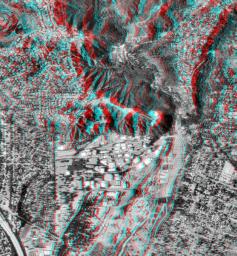This anaglyph shows NASA's Jet Propulsion Laboratory (JPL) in Pasadena, California. Red-blue glasses are required to see the 3-D effect. The surrounding residential areas of La Canada-Flintridge (to the left) and Altadena/Pasadena (to the right) are also shown. JPL is located at the base of the San Gabriel Mountains, an actively growing mountain range, seen towards the top of the image. The large canyon coming out of the mountains (top to bottom of image) is the Arroyo Seco, which is a major drainage channel for the mountains. Sand and gravel removal operations in the lower part of the arroyo (bottom of image) are removing debris brought down by flood and mudflow events. Old landslide scars (lobe-shaped features) are seen in the arroyo, evidence that living near steep canyon slopes in tectonically active areas can be hazardous. The data can also be utilized by recreational users such as hikers enjoying the natural beauty of these rugged mountains.
This anaglyph was generated using topographic data from the Shuttle Radar Topography Mission to create two differing perspectives of a single image, one perspective for each eye. The detailed aerial image was provided by U. S. Geological Survey digital orthophotography. Each point in the image is shifted slightly, depending on its elevation. When viewed through special glasses, the result is a vertically exaggerated view of the Earth's surface in its full three dimensions. Anaglyph glasses cover the left eye with a red filter and cover the right eye with a blue filter.
The Shuttle Radar Topography Mission (SRTM), launched on February 11, 2000, uses the same radar instrument that comprised the Spaceborne Imaging Radar-C/X-Band Synthetic Aperture Radar (SIR-C/X-SAR) that flew twice on the Space Shuttle Endeavour in 1994. The mission is designed to collect three-dimensional measurements of the Earth's surface. To collect the 3-D data, engineers added a 60-meter-long (200-foot) mast, an additional C-band imaging antenna and improved tracking and navigation devices. The mission is a cooperative project between the National Aeronautics and Space Administration (NASA), the National Imagery and Mapping Agency (NIMA) and the German (DLR) and Italian (ASI) space agencies. It is managed by NASA's Jet Propulsion Laboratory, Pasadena, CA, for NASA's Earth Science Enterprise,Washington, DC.
Size: 2.2 km (1.4 miles) x 2.4 km (1.49 miles)
Location: 34.16 deg. North lat., 118.16 deg. West lon.
Orientation: looking straight down at land
Original Data Resolution: SRTM, 30 meters; Aerial Photo, 3 meters.
Date Acquired: February 16, 2000
Image: NASA/JPL/NIMA

 Planetary Data System
Planetary Data System












